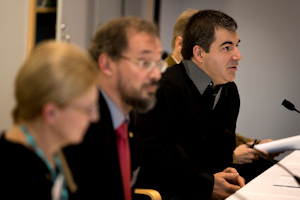Oct 15 2013
The Graphene Flagship – one of Europe’s first ten-year, €1bn flagships in Future and Emerging Technologies – has been launched.
 Sir Kostya Novoselov (right) and Professor Jari Kinaret at the launch
Sir Kostya Novoselov (right) and Professor Jari Kinaret at the launch
The Flagship was selected as one of Europe’s first technology flagships by the European Commission in January 2013. Graphene pioneers Sir Andre Geim and Sir Kostya Novoselov sit on the seven-man Strategic Advisor Council and The University of Manchester is one of the member organisations.
Last week, a flagship sail was symbolically set jointly by Wolfgang Bosch of the European Commission, Karin Markides, President of Chalmers University of Technology, and Nokia representative Tapani Ryhänen.
The mission is to take graphene and related-layered materials from academic laboratories to society, revolutionise multiple industries and create economic growth and new jobs in Europe.
The voyage of Graphene Flagship is divided into two separate phases: a 30-month ramp-up phase under the seventh Framework Programme (1 October 2013 – 31 March 2016) with a total European Commission funding of €54m, and a steadystate phase under the Horizon 2020 programme, starting 1 April 2016, with expected European Commission funding of €50m per year.
Carl-Christian Buhr, member of the Cabinet of European Commission Vice-President Neelie Kroes, said: "Now, we are all in this together, the Commission and all the academic and industrial partners of The Graphene Flagship. It’s is an unusually long-term commitment, and there will be challenges, let’s be clear about that.
"One challenge will be to keep the agility, to get the right new partners inside, so that you can react and steer in a new direction as the context changes. Another is of course the scientific challenge. Thirdly, we need to bring in industry in such a way, that ideas are taken up in a way that leads to new products and markets. That’s the whole idea of the flagship."
The consortium of Graphene Flagship initially includes 75 academic and industrial partners in 17 European countries. It focuses on the general area of communications, concentrating on ICT and on the physical transport sector, and supporting applications in the fields of energy technology and sensors.
The consortium will be expanded with another 20-30 groups through an Open Call, to be issued in November 2013, which will further strengthen the engineering aspects of the Graphene Flagship. The Executive Board of the Graphene Flagship will decide details on topics of the Open Call, its funding limits and final rules during October 2013.
Parallel to this, work is performed among EU member states and associated nations, through an ERA-NET, to coordinate national funding initiatives on graphene, complementing Graphene Flagship funding from the European Commission. Graphene Flagship launches a range of initiatives focused on graphene dissemination within and outside the flagship.